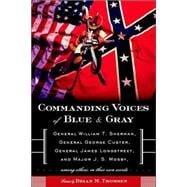
Note: Supplemental materials are not guaranteed with Rental or Used book purchases.
Purchase Benefits
What is included with this book?
| Introduction--Commanding Voices | p. 9 |
| From the Message to Congress in Special Session, July 4, 1861 Memoranda of Military Policy, July 23, 1861 | p. 13 |
| First Inaugural Address, February 18, 1861 | p. 25 |
| From West Point to the Battlefield | p. 31 |
| Excerpt from Mosby's War Reminiscences | p. 51 |
| Excerpt from McClellan's Own Story | p. 77 |
| Excerpts from From Manassas to Appomattox | p. 113 |
| Excerpt from Chancellorsville and Gettysburg | p. 135 |
| Excerpts from Recollections of a Confederate Staff Officer | p. 153 |
| Excerpt from Memoirs of General W. T. Sherman | p. 171 |
| Excerpt from Advance and Retreat | p. 205 |
| Excerpt from An Autobiography | p. 237 |
| A Memoir of the Last Year of the War for Independence in the Confederate States of America | p. 273 |
| Closing Valediction | p. 379 |
| List of Published Source Materials | p. 381 |
| Table of Contents provided by Ingram. All Rights Reserved. |
The New copy of this book will include any supplemental materials advertised. Please check the title of the book to determine if it should include any access cards, study guides, lab manuals, CDs, etc.
The Used, Rental and eBook copies of this book are not guaranteed to include any supplemental materials. Typically, only the book itself is included. This is true even if the title states it includes any access cards, study guides, lab manuals, CDs, etc.
Excerpted from Commanding Voices of Blue and Gray: General William T. Sherman, General George Custer, General James Longstreet, and Major J. S. Mosby, among Others, in Their Own Words
All rights reserved by the original copyright owners. Excerpts are provided for display purposes only and may not be reproduced, reprinted or distributed without the written permission of the publisher.